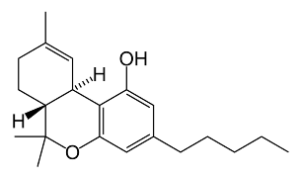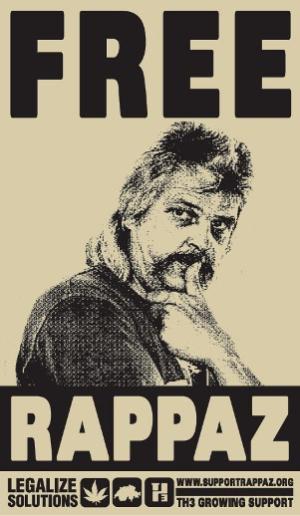The drug war has become an issue in the Kentucky Senate race after Republican Rand Paul attacked federal funding of drug task forces.
Despite some confusing reporting in the past couple of weeks, the bottom line in Germany is "no" to medical marijuana, but "yes" to Sativex.
Colombian President Santos agrees with Mexican President Calderon that it's time for a debate on drug legalization--and California's Prop 19 is weighing on his mind.
The big news in Mexico this week was the capture of "La Barbie," a major figure in the drug wars. Will it make any difference?
A pioneering Swiss cannabis/hemp activist, Bernard Rappaz, has renewed his hunger strike after being re-imprisoned by Swiss authorities.
Oh, temptation, such a torment for the weak-willed. A South Carolina cop peddle's his drug dog's training dope, an Iowa cop gets caught with a bunch of coke, and a Florida trooper is profiling out-of-state pain patients and stealing their medicine.
The marijuana extract Sativex has been approved to treat another condition in Canada. That makes three.
In California, small time pot possession is still a misdemeanor even though the maximum sentence is a $100 fine. The legislature has just passed a bill to fully decriminalize it by making it an infraction.
A Detroit pot legalization initiative had enough signatures to qualify for the ballot, but a city commission disqualified it, and now a local judge has agreed. An appeal may come, but it may be too late.
Las Vegas is most definitely not on the way to becoming Amsterdam-in-the-Desert, if a new poll is to be believed.
Events and quotes of note from this week's drug policy events of years past.
Drug policy has become a hot-button issue in the Kentucky US Senate race, albeit in a weird and tangential way. The race pits insurgent tea party/libertarian Republican Rand Paul, the son of anti-prohibitionist US Rep. Ron Paul (R-TX), against Democrat Jack Conway, the Kentucky attorney general.

Rand Paul campaigning in Frankfort, KY (courtesy Gage Skidmore via Wikimedia)
Neither candidate even mentions drug policy on their campaign web sites, but remarks by Paul earlier this month that he opposed federal earmarks such as those that fund the anti-drug task force Operation UNITE and drug treatment programs, and that drug policy was not a "
pressing issue" for Kentucky voters have reverberated across the Bluegrass State.
"I don't think it's a pressing issue," Paul said in response to a query from the Associated Press about his opposition to federal earmarks for drug law enforcement. He suggested that eastern Kentucky voters are more concerned with fiscal and cultural issues. "They're socially conservative out there," Rand said. "Jack's not. They're fiscally conservative. I am. Jack's not. I think we'll swamp him."
Paul's comments left an opening for Conway, who is trailing by about eight points in the most recent polls, to go on the attack. And the back and forth between the two campaigns has kept the drug issue in the spotlight since mid-August.
"Rand will handcuff local sheriffs trying to combat the drug epidemic, and I will make sure Kentucky's law enforcement has the tools they need to protect our families," Conway said. "That's my record as attorney general, and that's what I'll do in Washington."
Conway said that Kentucky, which is suffering from budget cuts, can't take on drug traffickers without federal help. Paul countered that that federal involvement is justified only when drugs are crossing state or federal borders.
Conway and his supporters have frequently resorted to describing drug use in Appalachian Kentucky, known as a marijuana growing hotbed and the home of numerous pill-poppers and meth cooks, as an "epidemic," and the conventional wisdom in Kentucky is that the area is rife with drug abuse.
But the conventional wisdom doesn't match up with the numbers. According to a
recent report from the federal Substance Abuse and Mental Health Services Administration, drug use levels in eastern Kentucky are in line with those in the rest of the state and the rest of the country. The "epidemic," in other words, is a politically convenient figment of the collective imagination.
But that doesn't stop either campaign from bemoaning it. After an initial round of attacks from Conway and his supporters on the drug issue, Paul made a point of showing up at a privately-funded drug treatment center to insist that he does care about "the drug problem."
"It's been recently insinuated that somehow I don't care about the drug problem in Kentucky, and that's absolutely wrong,"
Paul said last week. He accused Conway of "pandering" on the drug issue.
The back and forth continued this week, with the Paul campaign accusing Conway of not doing enough to combat methamphetamine production as attorney general and the Conway campaign bringing out sheriffs to attack Rand for undercutting their drug war.
But for all the blows thrown around the drug issue, Paul's attack on federal funding for drug task forces and drug treatment does not appear to be part of an anti-prohibitionist assault on drug war orthodoxy -- Paul does not call for ending marijuana prohibition or drug prohibition in general. Instead, it is part and parcel of his anti-federal spending campaign message.
And while Paul supported medical marijuana in the primary campaign, he has
gone a bit squishy on the issue since then. In August, the AP ran a story saying that "he said he opposed the legalization of marijuana, even for medicinal purposes." The campaign didn't deny or confirm that report for more than a week, until asked directly about it by Mike Meno of the
Marijuana Policy Project. Campaign staffers then told Meno Paul was standing by his states' rights position on the issue, but refused to say whether Paul personally supported medical marijuana.
"His big campaign message is to cut back on the size of the federal government, get the deficit under control, and he's been heavy-handed in going after earmarks like Operation UNITE, and those are very important in this state," said University of Louisville political scientist Laurie Rhodebeck. "So some of the sheriffs and mid-level political people, particularly in Eastern Kentucky, are not happy with what Paul's been saying about that. I don't know that these folks were likely to support him in the first place, but I've seen even some Republican county executives who seem appalled he's taking this position," she said.
"Part of Paul's strategy is to try to make Conway look like just another robot for Pelosi and Obama," said Rhodebeck. "Conway has to latch onto some issues, and the drug issue presented itself as something he can run with. I think it's a reasonable strategy for him to pursue this."
"Those federal task forces are just another way to waste money on an utterly failed strategy," said Ted Galen Carpenter, an analyst with the libertarian-leaning
Cato Institute, who agreed with Paul's attack on Operation UNITE. "If we want to spend money studying a way out of prohibition, that's one thing, but I wouldn't favor spending another dollar to enforce our idiotic drug laws."
Still, Carpenter took Paul to task for saying drug policy was not "a pressing issue" for Kentucky voters. "This most certainly is a pressing issue," he said. "Aside from the continuous civil liberties issues, people in Kentucky should be just as concerned as most of the rest of the country about that conflagration we have going on across our southern border. As long as the US maintains its prohibitionist policies, we are giving billions of dollars to the Mexican cartels, and that's dangerously unwise. One wonders whether Rand Paul has taken a look at what's happening in Mexico."
The emergence of the drug issue in Kentucky and especially the critique from a Republican candidate suggests that it is an issue that can prove useful to either party, said Bill Piper, national affairs director for the
Drug Policy Alliance. But if Republicans want to make drug reform an issue, they have to be more coherent than Paul, he said.
"That Rand Paul is stepping out on drug policy reform and his opponent attacking him for it shows that reformers shouldn't take for granted that the Democrats are the party of reform," said Piper. "There was also a Republican drug reformer in the primary against Texas Gov. Rick Perry, and a Republican running against Barney Frank has said some things, so you have a legalizer Republican versus a legalizer Barney Frank."
But while Republicans are increasingly challenging the drug policy status quo, they don't know how to reach voters on the issue, Piper said. "Rand Paul doesn't know how to talk about this," he said. "He's talking about this in the context of taxes and spending, but as much as voters dislike taxes and spending, they've always made an exception for the drug war. He needs to be talking about how drug reform reduces the harms of drugs and keeps families safer."
Paul could take a lesson from another libertarian-leaning Republican, former New Mexico Gov.
Gary Johnson, Piper said. "Gary Johnson got beaten up savagely before he learned how to frame it," he recalled. "Johnson still talks about freedom, but now he does a lot to reassure the listener that he cares about the problems associated with drug use."
"If Paul took this on head-on like Gary Johnson does and began saying it better, he would sound more rational than the Democrats," Piper said. "But by limiting the discussion to what the federal government should be doing, he's almost conceding his opponent's points. I suspect Rand Paul gets it about drug prohibition and he wants to wrap it in a safe way, but drugs is not an issue you can do that with. You have to say the war on drugs is making your teens less safe."
For Rand Paul, the real issue is not drug reform, but reining in federal spending. Whether his foray into the morass of drug politics will derail his campaign remains to be seen.
(This article was published by StoptheDrugWar.org's lobbying arm, the Drug Reform Coordination Network, which also shares the cost of maintaining this web site. DRCNet Foundation takes no positions on candidates for public office, in compliance with section 501(c)(3) of the Internal Revenue Code, and does not pay for reporting that could be interpreted or misinterpreted as doing so.)back to top
German press reports a couple of weeks ago carried headlines saying "Lawmakers Ready to Approve Medical Marijuana" and "Germany Plans to Legalize Medical Marijuana." Those reports were incorrect, and so was the Drug War Chronicle story based on them, "Germany Legalizing Medical Marijuana." (The title to that story, which we have since updated, now reads "Reports of Germany Legalizing Medical Marijuana Are Premature.")

Tetrahydrocannabinol (courtesy wikimedia.org)
According to the
International Association for Cannabis as Medicine, whose executive director, Dr. Franco Grotenherman, also heads the German Association for Cannabis as Medicine, what actually happened is that the German government has modified its drug laws to reclassify marijuana from Annex I (no medical use) to Annex II, as long as it is "intended for the productions of preparations for medicinal purposes" -- not raw marijuana.
The health ministry also approved adding "cannabis extract (extract obtained from plants and parts of plants belonging to the species cannabis) in preparations approved as medicines" to Annex III of the drug law. That means that
Sativex, a sublingual marijuana extract composed primarily of the compounds Tetrahydrocannabinol (THC) and Cannabidiol, will qualify as medicine under German law, and that its maker, Britain-based
GW Pharma, can now apply to market it there.
GW Pharma is partnering with the pharmaceutical giant Bayer in marketing Sativex. Approval to use Sativex in Germany is expected to happen next year. It will only be approved for the treatment of spasticity in multiple sclerosis.
GW Pharma's move in Germany is part of a broader roll-out of Sativex, which has already been approved for limited use in Britain, won preliminary approval in Spain, and this week, was approved for MS spasticity in
Canada. The company also plans to seek approvals in other European Union countries, including France and Italy.
"There are media reports that the German government is intending to ease the access to cannabis for medicinal purposes," said Dr. Grotenhermen in response to a Chronicle query. "Most of the reports are misleading. The German government has agreed to allow pharmaceutical companies to apply for approvals on cannabis-based medicines in Germany. No other changes with regard to the medical use of cannabis are intended by the German government. The German Association for Cannabis as Medicine is calling the media reports initiated by the German government 'misleading,' since they suggest that cannabis will be available in Germany soon for many patients, while it is only for spasticity in MS after the approval of Sativex for this indication," Grotenherman said.
"The German government announced a 'major breakthrough' for cannabis as medicine in Germany, and nearly all the newspapers repeated this without knowing what the 'breakthrough' actually was," explained German hemp activist
Steffen Geyer. "The next day, the
real decision was made public, and it basically said they will change the law so Bayer can sell Sativex to patients with multiple sclerosis. The 'breakthrough' is really a small step, and they aren't doing it for the patients, but for the companies."

Cannabidiol (courtesy Cacycle, wikimedia.org)
And that means no relief in sight for most of Germany's medical marijuana patients. As things now stand, people in Germany who want to use medical marijuana have two choices: If all other treatment options have been tried already, they can be prescribed Marinol, which is expensive and typically not covered by health insurance. Or, since a German court ruling forced the government's hand, they can apply to the government for special permission to use medical marijuana.
Only about 40 patients are permitted to do so, and they must buy their medical marijuana from a Dutch supplier, Bedrocan, in German pharmacies. They cannot grow their own, and no one can grow it for them, either. Just last month, the Federal Institute for Drugs and Medical Devices
rejected a patient's bid to grow his own. The patient had permission to get cannabis at the pharmacy, but said he could not afford it.
"Most patients who tried Marinol said it didn't work like natural cannabis, so after a couple of years, the institute 'invented' an extract made from cannabis flowers and sesame seed oil," said Geyer. "That didn't work, either. It was even worse than Marinol. Again, a couple of years went by, some more patients died, then the court ruling forced the government to allow some patients to use cannabis as medicine. But that Dutch medical marijuana is expensive, so most patients can't afford the amount they actually need. But since, like everybody else, they are not allowed to buy or grow their own, some of them are in jail."
Pharmaceutical Bedrocan goes for $18-30 a gram, while black market marijuana sells for $6-15 a gram, Geyer reported.
"So, none of this changes, and now the wonderful news that Germany will be the next country where Bayer can get richer by selling Sativex," the activist sardonically noted. "But it won't be in the pharmacies, it will only be for specified conditions, you will still have to try all the other therapies first, and health insurance won't pay the bill."
The German government's resistance to expanding access to medical marijuana comes even as opinion polls show strong support for it among the citizenry. An
August poll had 76% of German voters in favor of medical marijuana and only 18% opposed. Similarly, 65% said health insurance should pay for it.
Medical marijuana patients and would-be patients need to continue to organize, said Geyer. "We need to get the German patients more political," he said. "For the last 10 years, there was often a gulf between 'good' patients and 'bad' recreational users, and that sucked the political power out of the movement. But patients started to see this as a problem, and have begun to ask hemp activists about advice for political campaigns. This year, for example, for the first time, we had legal patients marching in the Hemp Parade, and that led to widespread news coverage related to cannabis medicine."
Geyer has a plan. "The next step on my medical cannabis agenda is to get more patients to ask for legal permission to grow their own marijuana," he said. "The cost problem may make that possible. Both Marinol and the Bedrocan are far, far more expensive than the plant, and most patients just don’t have the money. There is a chance this will work soon. After the first couple of 'I Can Grow' patients, I would like to establish a patients' cannabis social club, but that's at least two or three years away."
Germany has allowed corporate cannabis medicine a foot in the door, but it is so far still leaving the vast majority of possible beneficiaries of medical marijuana -- the patients -- on the outside waiting to get in.
back to top
Colombian President Juan Manuel Santos said in a Mexico City radio interview Wednesday that he supported Mexican President Felipe Calderon's call for a debate on drug legalization. He also said that he will seek to build a united front with Peru and Mexico on legalization if voters in California approve marijuana legalization in November.

President Santos as candidate, June 2010
meeting with Secretary Clinton
Colombia and Peru are the world's top cocaine producers. Mexico is the leading hemispheric producer of marijuana and opium, as well as being the home to some of the world's wealthiest and deadliest drug trafficking organizations.
"We are entering the era of the drug trafficking business where one must have these types of reflections," Santos said. "President Calderon is right to call for this to be discussed, without meaning that one is in agreement or not with the position of legalization."
Santos eyed California's
Proposition 19 marijuana legalization initiative with mixed feelings. "How would we explain to an indigenous person on a Colombian mountain that producing marijuana is illegal and take him to jail or destroy the marijuana when in the US it is legal to consume it?" he asked.
Santos said he was perturbed by the distinction made by some in the US between "soft" drugs like marijuana and "hard" drugs like cocaine or heroin. "Where do we draw the line?" he asked.
"We are all affected by this scourge of drug trafficking," Santos said, referring to Colombia, Mexico, and Peru. "We must sit down and work out how we are going to react and what is going to happen after this referendum," he said. "All strategies that are combined are more effective."
Colombia cannot legalize the drug trade by itself, Santos said. "Unilaterally, we cannot legalize drugs because they are a problem not only for national security, but there are also international implications."
That President Santos should make such remarks is not much of a surprise. In 1998, as head of the Good Government Foundation, he co-signed an open letter to then UN Secretary General Kofi Annan calling for a "frank and honest evaluation of global drug control efforts" because "we believe the global war on drugs is now causing more harm than drug abuse itself."
And two years ago, he told a London conference on cocaine that
legalization should be part of the debate. He said then that there was no political will to do that. Time will tell if anything has really changed in that regard.
back to top
by Bernd Debusmann, Jr.
Mexican drug trafficking organizations make billions each year smuggling drugs into the United States, profiting enormously from the prohibitionist drug policies of the US government. Since Mexican president Felipe Calderon took office in December 2006 and called the armed forces into the fight against the so-called cartels, prohibition-related violence has killed more than 28,000 people, the government reported in August. The increasing militarization of the drug war and the arrest of dozens of high-profile drug traffickers have failed to stem the flow of drugs -- or the violence -- whatsoever. The Merida initiative, which provides $1.4 billion over three years for the US to assist the Mexican government with training, equipment and intelligence, has so far failed to make a difference. Here are a few of the latest developments in Mexico's drug war:

La Barbie, captured
In Monterrey,
the State Department told staff to send their children away from the city due to the ongoing drug-related violence. As of September 10
th, no minor dependents will be allowed. Other diplomatic postings with a similar rule include Baghdad, Kabul, and Sa’naa, Yemen. The decision comes after a botched kidnapping attempt at a school attended by many of the children of US consulate staff.
In Ciudad Victoria, Tamaulipas,
a car bomb exploded outside the local offices of Televisa. Nobody was wounded in the blast.
Sunday, August 29
In Hidalgo, Tamaulipas,
the mayor was shot dead after being ambushed. Marco Antonio Leal Garcia was 46 years old. His four-year old daughter was seriously wounded in the attack.
In Reynosa, two car bombs were detonated near a morgue in which the bodies of 72 murdered migrants are being held. Fifteen people were wounded by the blasts.
In Panuco, Veracruz,
at least eight people were killed after a 15-hour firefight between soldiers and suspected cartel gunmen. One soldier and one civilian were killed, as well as six gunmen.
Monday, August 30
Near Mexico City,
police captured Edgar Valdez Villareal, a top drug cartel boss and the leader of a faction of the Beltran-Leyva Organization. Valdez, also known as "La Barbie," is thought to be responsible for much of the violence in Central Mexico in recent months as he battled his former ally Hector Beltran-Leyva for control of the Beltran-Leyva Organization, which was left leaderless after Marines shot dead Arturo Beltran-Leyva in December.
In Cancun,
eight people were killed after a bar was firebombed. Four of the dead were women. The same bar had reported two extortion attempts in the past, apparently by the Zetas Organization.
In Mexico City,
police announced that 3,200 federal police officers have been fired after failing drug and lie detector tests, or having assets which could not be accounted for. A separate batch of 465 officers is due to be fired in Juarez. Among them is a police commander who was detained at gunpoint by his own men who were angry at his misconduct.
In Ciudad Juarez,
authorities announced that celebrations for Mexico's bicentennial on September 16
th were to be canceled due to the ongoing violence. Independence Day is Mexico's most important national day and public gatherings to celebrate are an integral part of the culture of most towns and cities.
Wednesday, September 1
In Ciudad Juarez,
at least ten people were murdered across the city. Three of the victims were minors aged 11, 13 and 16. The killings bring Ciudad Juarez's 2010 total to approximately 2,039.
Total Body Count for the Week: 239
Total Body Count for the Year: 7,570
Read the previous Mexico Drug War Update here.back to top
Swiss cannabis pioneer Bernard Rappaz has renewed his hunger strike after being returned to prison on the failure of his appeal to the country's Federal Tribunal. Rappaz is serving a 68 month sentence for cannabis distribution after running afoul of conservative pot laws in the canton of Valais, where he lives.

Free Bernard Rappaz campaign poster
Rappaz had been on a 50-day hunger strike while imprisoned earlier this year and was hospitalized in Bern while Valais authorities dithered over whether to force-feed him against his written wishes. Instead, they released him to house arrest last month pending his appeal.
The appeal was turned down last week and Rappaz was returned to prison. He restarted his hunger strike on Monday.
Rappaz, a long-time cannabis and hemp activist, has long been a burr under the saddle of authorities in the conservative canton. They responded first with his original prosecution and sentencing (a partner was sentenced only to parole), then again by bringing a series of new charges against him shortly after he was released on house arrest last month. The new charges, for offenses that allegedly took place between 2002 and 2006, include document falsification, money laundering, violation of drug laws, and social benefits fraud.
There is an international campaign to free the Swiss activist, who is sometimes referred to as "the Gandhi of hemp." There is a French language
Support Bernard Rappaz Facebook page and
Solidarity with Bernard Rappaz web site. For English speakers, the European Coalition for a Just and Effective Drug Policy (ENCOD) has a
Bernard Rappaz web page.
back to top
Oh, temptation, such a torment for the weak-willed. A South Carolina cop peddles his drug dog's training dope, an Iowa cop gets caught with a bunch of coke, and a Florida trooper is profiling out-of-state pain patients and stealing their medicine. Let's get to it:

police officer with drug dog, Port Authority of New York & New Jersey
In Swansea, South Carolina,
a Swansea police officer was arrested Monday for allegedly selling "training drugs" to people in the community. Charles Schuler, 37, was a K-9 officer and would be given small amounts of drugs to train his dog. But the department got a tip that Schuler was visiting a "known drug house" while on duty, and when police raided the place Monday, two people inside said Schuler supplied them with drugs. He is charged with misconduct in office and is being held at the Lexington County Detention Center on $100,000 bond. Oh, and he's now a former Swansea police officer. He was fired the same day he was arrested.
In Muscatine, Iowa,
a Muscatine police officer was arrested Saturday after getting busted with 1.5 ounces of cocaine. Officer Scott Burk, 47, is charged with possession of a controlled substance with intent to deliver and a drug tax stamp violation, both felonies. He's looking at up to 15 years in prison if convicted on both counts. His arrest came after an investigation by the Iowa Bureau of Investigation, which has so far not released further details. Burk had worked an overnight patrol shift since November, but for a year before that, he had been an officer on the Muscatine County Drug Task Force. Last month, the state auditor reported that at least $8,810 in cash and money orders held by the task force could not be accounted for. Burk has not been named as a suspect in that. He is jailed on a $2,500 cash bond. He has been fired.
In Fort Pierce, Florida,
a former Florida Highway Patrol trooper faces a drug possession charge after being accused of targeting cars with Kentucky and Tennessee license plates and stealing prescription drugs from their drivers and passengers. Former trooper Gary Bach faces one count of misdemeanor oxycodone possession. He went down after two separate complaints, one that alleged the theft of six Oyxcontin pills in October, and one in January in which a trooper was accused of stopping a vehicle because it had Kentucky plates. During an investigation that included the DEA, Bach told investigators it was "common knowledge" that people from Kentucky and Tennessee drove to Florida pain clinics to get prescriptions and that for two weeks last November he didn't stop anyone except people from those states as he investigated "doctor shopping." He was charged in May and resigned August 24.
back to top
Health Canada has given final approval for the use of Sativex, a sublingual marijuana extract, for the treatment of spasticity in multiple sclerosis patients, the drug's manufacturer, GW Pharmaceuticals, announced Tuesday. Canada had previously approved Sativex for neuropathic pain in MS patients in 2005 and for pain relief in cancer patients in 2007.

Cannabidiol, one of the two major compounds in Sativex (courtesy Cacycle, wikimedia.org)
"This means that people in Canada with MS experiencing the debilitating symptoms of spasticity, such as painful spasms and cramps, will now have a new treatment option in addition to standard therapy," the company said in a
press release.
The announcement comes as Sativex appears poised for a break-out. Already approved for use in Britain, it received preliminary approval earlier this month in Spain, and the German government announced two weeks ago that it would allow Sativex to apply for approval there. The company said it is also looking to market the drug in other European countries in association with Bayer.
"Following recent approvals in the UK and Spain, Canada is now the third major country to approve Sativex for symptomatic relief of spasticity in adult patients with MS," said Dr. Steven Wright, GW's research and development director. "This regulatory approval has come several months earlier than anticipated and GW looks forward to working with Bayer to develop the marketing strategy for this new indication."
back to top
Just hours before the state's legislative session ended Tuesday, the California Assembly voted to approve SB 1449, Sen. Mark Leno's bill to fully decriminalize simple marijuana possession. The bill passed the Senate in June and now goes to Gov. Arnold Schwarzenegger's desk.
The vote was 43-33 and largely along party lines. Democrats supported the bill 40-8, while Republicans opposed it 23-2.
Under current California law, possession of less than an ounce of pot is punishable by no more than a $100 fine, but is still a misdemeanor. That means people busted for a joint or a half-bag must be arrested, booked, and appear in court, and they get a criminal record. It also means meaningless work for the police and the courts.
Marijuana possession is the only California misdemeanor with a set maximum fine and no possible jail time. The Leno bill changes the offense to an infraction, meaning no arrest, no booking, no court appearance, and no criminal record.
"The penalty for possession of less than an ounce of marijuana is a fine of $100, with no jail time," Leno said on introducing the bill. "If the penalty is $100, with no jail time, that is an infraction. That is not a misdemeanor."
Keeping simple possession a misdemeanor has had "serious unintended consequences," the San Francisco Democrat said. "As the number of misdemeanor marijuana possession arrests have surged in recent years, reaching 61,388 in 2008, the burden placed on the courts by these low level offenses is just too much to bear at a time when resources are shrinking and caseloads are growing."
back to top
In an August 26 ruling, the Wayne County Circuit Court refused to order the Detroit city clerk to put a municipal marijuana legalization initiative on the November ballot. Initiative organizers, the Coalition for a Safer Detroit had gathered sufficient valid voter signatures to qualify for the ballot, but in a surprise move earlier this month, the city's Election Commission removed the measure from the ballot, saying it was preempted by state law.

Comerica Park, Detroit (wikimedia.org)
The Coalition for a Safer Detroit is now considering an appeal to the Michigan Court of Appeals. But with election day little more than two months away, there are questions about whether a decision would come quickly enough to get the measure back on the ballot in time.
The Wayne County Circuit Court took and decided the case on an expedited basis. It is not clear whether the appeals court could or would also do so.
The initiative would have legalized the possession of up to an ounce of marijuana on private property for people 21 or older. It would have done so by simply removing all references to simple marijuana possession by adults from the city code.
The coalition handed in more than 6,000 voter signatures earlier this year, and the initiative was approved by the same Detroit Election Commission that killed it August 9. After it was approved, in accordance with city law, the initiative went before the Detroit City Council, which could have voted to make the initiative law. By failing to vote on the initiative, the Council cleared the way for the voters to make their preferences known in November -- or so everyone thought.
But the Election Commission voted 3-0 to remove the measure from the ballot. The surprise move came after Detroit Corporation Counsel and commission member Krystal Crittenden told the commission that in the opinion of the city's law department, which she oversees, state law forbidding marijuana possession preempted the measure.
back to top
An 8 News Now/Las Vegas Review-Journal poll has found little support for legalizing Amsterdam-style cannabis cafes or prostitution. Only 30% of respondents supported retail marijuana sales and only 19% supported legalizing prostitution.

only gambling allowed (image courtesy commons.wikimedia.org)
The poll asked: "As a possible way to improve tourism, would you support or oppose legalizing Dutch-style hashish and marijuana bars in Las Vegas?" Nearly two-thirds (64%) of respondents said no, while 6% were undecided.
The poll was conducted last week by Mason-Dixon Polling and Research. The group surveyed 405 registered Clark County voters and had a margin of error of +/- 5%.
Setting up cannabis cafes would work against efforts to craft a more mainstream, family-friendly image for the long-time gambling destination, Mason-Dixon pollster Brad Coker told the Review-Journal. And hookers and hash bars may be too much even for the famously live-and-let-live city, he added. "Things are maybe a little desperate in Clark County these days, but I don't think they're quite that desperate yet," Coker said. "These kinds of issues push the limits of even a libertarian community. You could go to some very liberal communities, and the idea of legalizing prostitution would probably raise a few eyebrows."
The
Marijuana Policy Project had spent nearly a decade attempting to convince Nevada voters to legalize marijuana before pulling out earlier this month because of funding problems. Also contributing to that decision was
another poll earlier this month that had support for legalization at only 42%.
back to top
September 6, 1988: After two hearings, DEA administrative law judge Francis Young recommends shifting marijuana to Schedule II so it can be prescribed as medicine. He says, "It would be unreasonable, arbitrary, and capricious for DEA to continue to stand between those sufferers and the benefits of this substance in light of the evidence in this record." Judge Young notes that marijuana is safe and has a "currently accepted medical use in treatment" and that "marijuana, in its natural form, is one of the safest therapeutically active substances known to man."
September 5, 1989: In his first nationally-televised address from the Oval Office, President George Bush declares that narcotics are "the gravest threat facing our nation," and that he is stepping up the war on drugs. Bush waves a packet of seized "crack" cocaine around on national television and declares, "This is crack cocaine, seized a few days ago by Drug Enforcement Agents in a park just across the street from the White House," a claim that is later debunked. During the same address, Bush also demands the death penalty for kingpins like Pablo Escobar and calls for the largest budget increase to date in the history of the drug war by pledging $2 billion in aid to the Andean nations.
September 5, 1990: Los Angeles Police Chief Daryl F. Gates testifies before the US Senate Judiciary Committee that casual drug users should be taken out and shot. He does not mention his own son's casual drug use.
September 4, 1991: US District Judge Juan Burciaga says, "The fight against drug traffickers is a wildfire that threatens to consume those fundamental rights of the individual deliberately enshrined in our Constitution."
September 2, 1994: In Detroit, Judge Helen E. Brown sentences Lazaro Vivas to life in prison for possession of over 650 grams of cocaine. Judge Brown tells Vivas, "I don’t think it’s fair. It is not a sentence I would give you, if I had any choice. But I have to give you this sentence, because I have to follow the law. So, your sentence is life."
September 6, 1999: Jorge Castaneda, who later becomes Mexico's foreign minister during the Vicente Fox administration, writes in Newsweek: "In the end, legalization of certain substances may be the only way to bring prices down, and doing so may be the only remedy to some of the worst aspects of the drug plague: violence, corruption, and the collapse of the rule of law."
September 6, 2000: The Ottawa Citizen reports that Jaime Ruiz, the Colombian president's senior adviser, said, "From the Colombian point of view [legalization] is the easy solution. I mean, just legalize it and we won't have any more problems. Probably in five years we wouldn't even have guerrillas. No problems. We [would] have a great country with no problems."
September 8-9, 2000: Green Party presidential candidate Ralph Nader joins New Mexico's Republican Governor Gary Johnson in criticizing the nation's war on drugs, calling for the legalization of marijuana and reform of what Nader calls "self-defeating and antiquated drug laws." Rehabilitating drug addicts gives a far better payoff than "criminalizing and militarizing the situation," he said. "Study after study has shown that, and yet somehow it doesn't get through to federal policy."
September 4, 2001: Two prominent Michigan marijuana law reform activists are shot dead, following a week-long standoff at their 34-acre "Rainbow Farm" compound in Vandalia, Michigan. The confrontation followed a two-year investigation into allegations of marijuana use at the campground.
September 7, 2001: Thirteen current and former Miami police officers are accused by US authorities of shooting unarmed people and then conspiring to cover it up by planting evidence. The indictment is the latest scandal for the city's trouble-plagued police force. All of those charged are veterans assigned to SWAT teams, narcotics units or special crime-suppression teams in the late 1990s.
September 5, 2002: DEA agents arrest Valerie and Michael Corral of the Wo/Men's Alliance for Medical Marijuana (WAMM) and destroy 150 marijuana plants intended for use by WAMM's members, most of whom are terminally ill.
back to top










